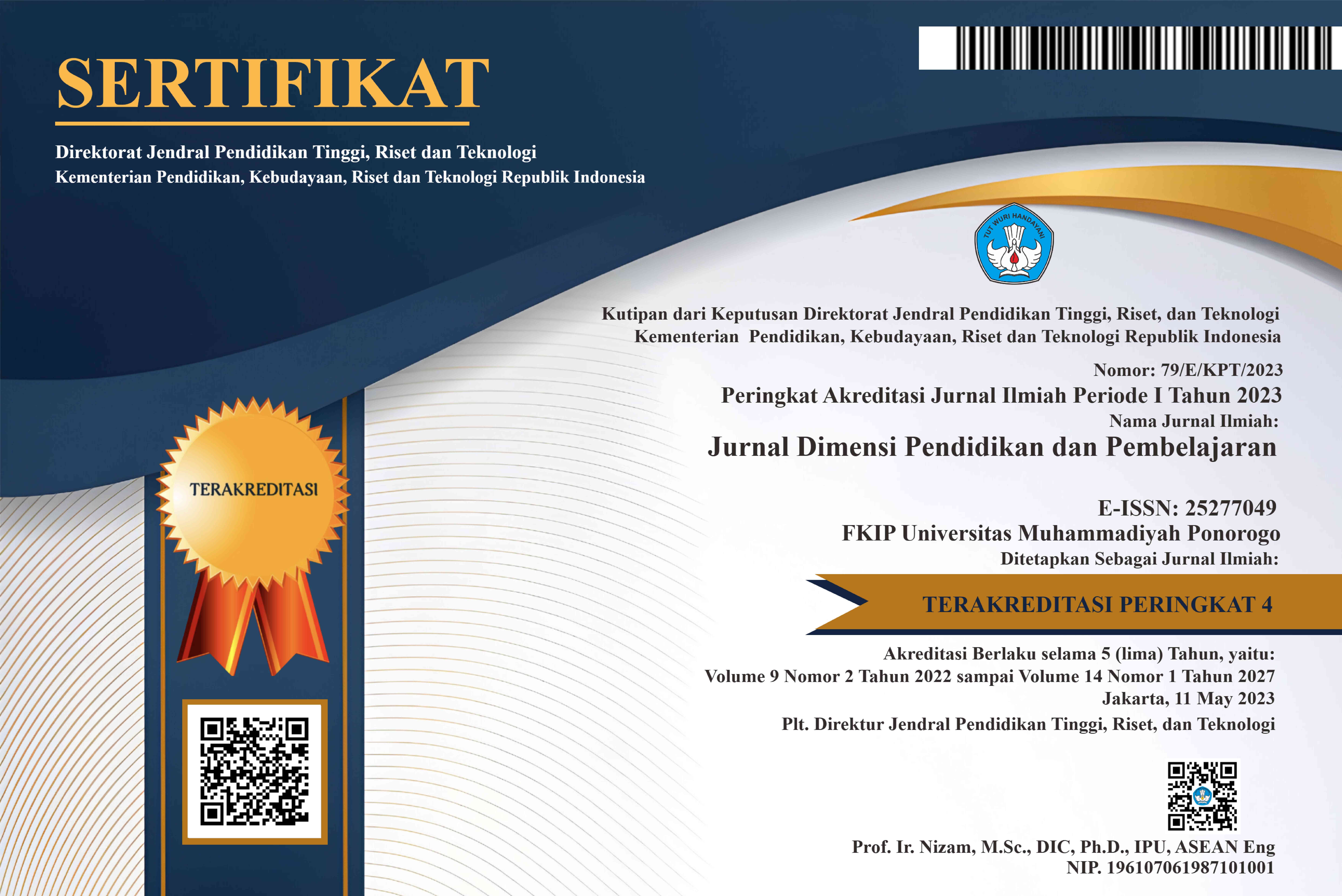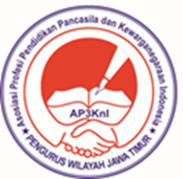Benefits and Challenges of Implementing Social Emotional Learning (SEL) in Education: A Systematic Literature Review
DOI:
https://doi.org/10.24269/dpp.v13i2.11837Abstract
This study investigates two research questions: (1) What are the benefits of implementing Social Emotional Learning (SEL) in educational settings? and
(2) What challenges are faced in implementing SEL within educational contexts? A systematic literature review was conducted by analyzing peer-reviewed articles published between 2019 and 2024 across databases such as Google Scholar, ERIC, ScienceDirect, and Garuda. The research design follows Tóth et al. (2023), applying the PICOC criteria (Population, Intervention, Comparator, Outcome, Context) and thematic analysis from international and Indonesian journals. Addressing the first research question, four key benefits of SEL emerged: (1) enhanced self-awareness and emotional regulation among Generation Z; (2) improved communication and intercultural collaboration in language learning; (3) academic gains through increased motivation, engagement, and critical thinking; and (4) promotion of equity through inclusive environments. In response to the second question, five significant challenges were identified: (1) limited teacher competence in SEL; (2) misaligned curriculum and assessment systems; (3) cultural and contextual barriers; (4) digital adaptation issues among Generation Z; and (5) rigid policies emphasizing narrow academic metrics. This review provides valuable insights for educators, policymakers, and researchers to support effective SEL integration in educational contexts by offering a balanced synthesis of advantages and obstacles.
References
Cahyono, H. (2016). POLA PENGEMBANGAN PENDIDIKAN KARAKTER SISWA (Sebuah studi di SDN 1 Polorejo). Jurnal Dimensi Pendidikan dan Pembelajaran, 3(2), 5-12. doi:https://doi.org/10.24269/dpp.v3i2.81
CASEL. (2020). CASEL's SEL framework: What are the core competence areas and where are they promoted? Collaborative for Academic, Social, and Emotional Learning.
Chaq, A. N., & Mahmudin, A. S. (2024). Urgensi penanaman nilai pendidikan karakter bagi generasi Z di era 5.0 dalam perspektif Al-Quran. JIEP: Journal of Islamic Education Papua, 1(2), 118-130. https://doi.org/10.53491/jiep.v1i2.815
Dzikrulloh, M., Rondli, W., & Darmuki, A. (2024). Meta Analisis Pengaruh Model Pembelajaran Abad 21 terhadap Profil Pelajar Pancasila Dimensi Bernalar Kritis pada Mata Pelajaran IPA di Sekolah Dasar. Jurnal Dimensi Pendidikan dan Pembelajaran, 12(2), 257-273. https://doi.org/10.24269/dpp.v12i2.9274
Fitratullah, F. (2023). Penerapan kompetensi sosial-emosional dalam pembelajaran Bahasa Inggris. EDUKASI: Jurnal Pendidikan, 11(1), 81-94. https://doi.org/10.47323/ujss.v4i1.271
Gulo, O., Ita, E., Meka, M., & Ngura, E. T. (2025). Utilization of Literacy Tree Media in Improving The Reading Ability of Low-Grade Students at SD Inpres Dhereisa. Jurnal Dimensi Pendidikan dan Pembelajaran, 13(Special Issue 1), 175–185. ISSN 2303-3800 (Online). http://dx.doi.org/10.24269/dpp.v13iSI1.11562
Hadiprayogo, B. (2023). Pengaruh Penerapan Kebijakan Pembelajaran Daring Terhadap Hasil Belajar Mahasiswa Di PG PAUD Universitas PGRI Argopuro Jember. Jurnal Dimensi Pendidikan dan Pembelajaran, 11(1), 47-56. https://doi.org/10.24269/dpp.v11i1.6196
Helaluddin, H., & Alamsyah, A. (2019). Kajian konseptual tentang social-emotional learning (SEL) dalam pembelajaran bahasa. Al-Ishlah: Jurnal Pendidikan, 2(1), 104-113. https://doi.org/10.35445/alishlah.v11i1.123
Jagers, R. J., Rivas-Drake, D., & Williams, B. (2019). Transformative Social and Emotional Learning (SEL): Toward SEL in Service of Educational Equity and Excellence. Educational Psychologist, 54(3), 162–184. https://doi.org/10.1080/00461520.2019.1623032
Jones, S. M., McGarrah, M. W., & Kahn, J. (2019). Social and Emotional Learning: A Principled Science of Human Development in Context. Educational Psychologist, 54(3), 129-143. https://doi.org/10.1080/00461520.2019.1625776
Kuhfeld, M., Soland, J., Tarasawa, B., Johnson, A., Ruzek, E., & Liu, J. (2020). Projecting the potential impact of COVID-19 school closures on academic achievement. Educational Researcher, 49(8), 549-565. https://doi.org/10.3102/0013189X20965918
Mahoney, J. L., Durlak, J. A., & Weissberg, R. P. (2020). An update on social and emotional learning outcome research. Phi Delta Kappan, 98(4), 17-23.
Mayer, J. D., & Salovey, P. (2016). The ability model of emotional intelligence: Principles and updates. Emotion Review, 8(4), 290–300. https://doi.org/10.1177/1754073916639667
Mengist, W., Soromessa, T., & Legese, G. (2020). Method for conducting systematic literature review and meta-analysis for environmental science research. MethodsX, 7, 100777. https://doi.org/10.1016/j.mex.2019.100777
Panadero, E. (2017). A review of self-regulated learning: Six models and four directions for research. Frontiers in Psychology, 8, 422. https://doi.org/10.3389/fpsyg.2017.00422
Petrides, K. V., & Furnham, A. (2017). Trait emotional intelligence: Foundations, measurement, and applications. Emotion Review, 9(3), 245–256. https://doi.org/10.1177/1754073916650493
Rosdiani, D., Puspitasari, D. R., & Jayamukti, S. D. N. (2022). Media Policindo (PohoLiterasi Produk Indonesia) Untuk Meningkatkan Minat Baca Peserta Didik. Journal of Innovation in Primary Education, 1(2), 152-161
Schlegel, K., & Mortillaro, M. (2020). Emotional intelligence: New perspectives and future directions. Current Opinion in Psychology, 33, 147–152. https://doi.org/10.1016/j.copsyc.2019.08.016
Shugufta, N., Ahmad, R., & Kumar, P. (2024). Analyzing the relationship between social-emotional competencies and academic achievement: A cross-sectional study. International Journal of Educational Research.
Sudirman, S., Ajam, A., & Pratiwi, I. (2024). Multiliteration in English teaching: A systematic literature review. Jurnal Pendidikan dan Ekonomi (JUPEK), 6(1), 84–96. https://doi.org/10.5281/zenodo.14311189
Taylor, R. D., Oberle, E., Durlak, J. A., & Weissberg, R. P. (2017). Promoting positive youth development through school-based social and emotional learning interventions: A meta-analysis of follow-up effects. Child Development, 88(4), 1156–1171. https://doi.org/10.1111/cdev.12864
Tóth, Ã., Suta, A., Pimentel, J., & Argoti, A. (2023). A comprehensive, semi-automated systematic literature review (SLR) design: Application to P-graph research with a focus on sustainability. Journal of Cleaner Production, 415, 137741. https://doi.org/10.1016/j.jclepro.2023.137741
Weissberg, R. P., Durlak, J. A., Domitrovich, C. E., & Gullotta, T. P. (2015). Social and emotional learning: Past, present, and future. In J. A. Durlak, C. E. Domitrovich, R. P. Weissberg, & T. P. Gullotta (Eds.), Handbook of social and emotional learning: Research and practice (pp. 3-19). The Guilford Press.
Wolters, C. A., & Brady, A. C. (2021). College students' time management: A self-regulated learning perspective. Educational Psychology Review, 33, 1319–1351. https://doi.org/10.1007/s10648-020-09519-z
Zeidner, M., Matthews, G., & Roberts, R. D. (2018). The science of emotional intelligence: Knowns and unknowns. In J. D. A. Parker, D. H. Saklofske, & K. V. Keefer (Eds.), Handbook of emotional intelligence in education (pp. 3–26). Springer. https://doi.org/10.1007/978-3-319-90633-1_1
Downloads
Published
Issue
Section
License
Copyright (c) 2025 Desma Astia Lavenda

This work is licensed under a Creative Commons Attribution 4.0 International License.
Copyright
Authors who publish their manuscripts in this journal agree to the following terms:
- The copyright on each article belongs to the author.
- The author acknowledges that Jurnal Dimensi Pendidikan dan Pembelajaran has the right to be the first to publish under a Creative Commons Attribution 4.0 International (Attribution 4.0 International CC BY 4.0) license.
- Authors may submit articles separately, arranging for the non-exclusive distribution of manuscripts that have been published in this journal to other versions (e.g., sent to the author's institutional repository, publication into books, etc.), acknowledging that the manuscript was first published in the Jurnal Dimensi Pendidikan dan Pembelajaran.
Â
License
Use of the article will be governed by the Creative Commons Attribution license as currently published under the Creative Commons Attribution 4.0 International License (Attribution 4.0 International (CC BY 4.0).
Â
This license permits anyone to copy and redistribute this material in any form or format, compose, modify, and make derivatives of this material for any purpose, including commercial purposes, as long as they give credit to the author for the original work.


_001.jpg)



